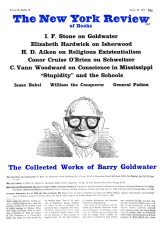Political pamphlets sometimes have surprising careers. Most of them are ephemeral production; they last their appointed time and vanish. But a few of them outlive ponderous treatises ostensibly written for the ages: the Communist Manifesto is treated as a classic in political theory, Luther’s ringing Pagan Servitude of the Church, as a great document in religious history. Sieyès’s What Is the Third Estate?, the Bourgeois Manifesto of the French Revolution, is not quite in the second category. Nor is it in the first: it deserves to survive, and so this version, the first complete edition in English, in a clear and accurate translation, is welcome. It has been supplied with considerable apparatus—a substantial, imaginative Introduction by Peter Campbell, and technical and historical notes by S. E. Finer, who provides essential information on the genesis of the pamphlet and on the issues to which it addresses itself—but this apparatus, weighty though it seems for such a relatively slight work, is by no means otiose. Neither Sieyès’s pamphlet, which was a stunning success, nor Sieyès’s career, which was (at least so far as France is concerned) a rather dreary failure, is well known outside a narrow circle of specialists.
The abbé Sieyès was not a profound political thinker, although—or should I say, and therefore?—he was superbly contemptuous of the writings of other political thinkers. Nor was his intellectual rigidity, coupled as it was with an adroit suppleness, a particularly attractive trait. Yet in a time as unstable as the revolutionary period, his talent for survival (which he himself reufully admitted) obviously had its value. When in 1788 Louis XVI summoned the Estates General, Sieyès was forty, in the middle span of a respectable but rather obscure clerical career. His What Is the Third Estate?, written in October and November of that year, and published in January 1789, lifted him out of his obscurity overnight. He became a prominent member of the National Assembly, and, later, of the Convention; participated in the writing of the Constitution of 1795 (an activity for which he had an obsessive passion); first helped to construct, and then plotted to destroy the Directory; briefly and pathetically competed with Napoleon Bonaparte after 18 Brumaire, lived prosperously under the Empire and, although his fortunes declined after that, managed to survive Napoleon and even the Revolution of 1830. When he died in 1836, contemporaries could look back on his long life and feel grudging respect for his careerism.
But more interesting than his talent for survival was another talent, to which What Is the Third Estate? brilliantly testifies: Sieyès had a remarkable sense of the inchoate grievances of millions, and converted inarticulate complaints into a coherent program, with superb clarity, admirable economy, and cutting sarcasms. He was, as Professor Campbell well shows in his Introduction, a democratic nationalist who held, with sententious rhetorical questions and bitter epigrams accessible to the meanest understanding, that the nation was primary and that privilege was vicious. The Third Estate had been nothing in law although it was everything in numbers and everything in talents, and should become something in law as well; and the nation must express its collective will through representative institutions. This doctrine is considered either commonplace today, or untrue, but in its day it was logical and revolutionary. It evoked an enthusiastic response not so much because the French bourgeoisie had been revolutionary before 1788. Quite the contrary: it had been largely quiescent and unpolitical. What Sieyès did was to tell the Third Estate what it ought to want, in phrases insinuating that of course it had wanted it all along. It is here that Sieyès’s historic interest resides: not so much in what he says (although, as Professor Campbell suggests, that has considerable relevance to the nationalist ideologists of the new African states) as in how he said it. Sieyès claims our attention mainly because he was one of those rare politicians who said the right thing at the right time in the right words.
This Issue
August 20, 1964



